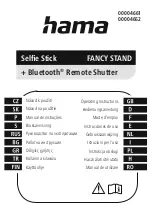
www.fieldcommunicator.com
U
SER
’
S
M
ANUAL
August 2009
475 F
IELD
C
OMMUNICATOR
S
ECTION
5
T
ROUBLESHOOTING
OVERVIEW
This section provides basic troubleshooting techniques for the 475 Field
Communicator.
Below are methods for troubleshooting networks that are experiencing problems
communicating between a device and the 475 Field Communicator.
Troubleshooting Suggestions
Answer the questions below and use the tables in this section before calling Technical
Support personnel.
• Does the control system have HART or fieldbus communication capabilities?
• Is it configured to communicate HART or fieldbus?
• Is it reporting communication problems? If not, stop communications on the control
system and re-test communication with the 475 Field Communicator.
• Is there a barrier installed?
• Is the barrier capable of passing along the signal?
HART Loops
Verify the HART loop current and voltage on the device. Almost all devices need at
least 4 mA and 12V DC to operate properly.
If there are multiple devices on a multidrop loop, set the 475 Field Communicator to
Poll by Address. See “Changing the HART Polling Options” on page 3-15 for more
information on polling options.
Inspection of the loop wiring can often reveal problems. The shield is normally
grounded at one end only, which is usually the control system.
Verify the loop has a minimum of 250 ohms resistance. If there is not an external
resistor, then, normally, the total resistance is the resistance of the process-indicating
device monitoring the loop. Check the manuals for the process-indicating device to
determine its loop resistance. If the resistance of the process-indicating device is
unknown, it can be determined by knowing the current flow in the loop and the voltage
across the process-indicating device.
The resistance can be calculated using the formula, Resistance = Voltage / Current.
The 475 Field Communicator can be used to measure the voltage; see “DC Voltage
Measurement (HART Terminals)” on page 3-18.
Summary of Contents for 475
Page 1: ...USER S MANUAL ...
Page 2: ......
Page 4: ...2 ...
Page 10: ...Introduction 1 2 ...
Page 34: ...Learning the Basics 2 24 ...
Page 80: ...Troubleshooting 5 10 ...
Page 93: ...B 7 ...
Page 94: ...B 8 ...
Page 95: ...B 9 ...
Page 96: ...B 10 ...
Page 102: ...C 6 ...
Page 108: ...G vi ...
Page 113: ......
















































